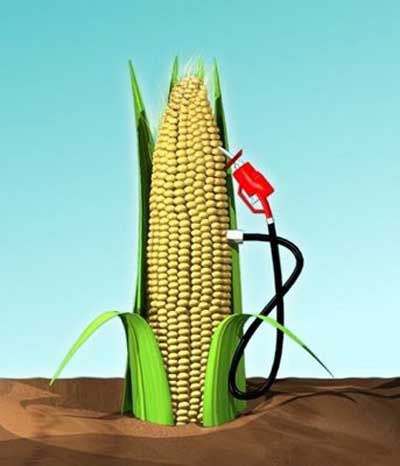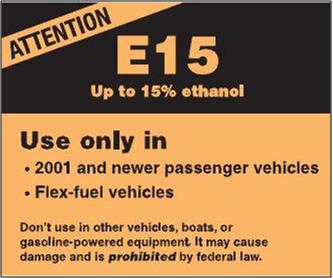Ethanol has been a key component of the U.S. Renewable Fuel Standard since the 2007 passage of the Energy Security and Independence Act.
Now, there appears to be a chance that rules requiring minimum volumes of ethanol to be blended into vehicle fuel could be reformed or scrapped altogether in 2014.
Political controversy, changes in U.S. energy mix, and opposition from several quarters have seen the allure of ethanol dim.
The alcohol fuel largely refined from corn in the U.S, hasn't had an easy ride over the last few years. Everything from raising its concentration in pump gas to 15 percent to the food-versus-fuel debate has concerned the industry and lawmakers alike.

Corn Ethanol Pump
Now, as CNBC reports, some politicians plan to work toward removing ethanol from the renewable fuel standard (RFS) entirely. That set of rules requires increasing amounts of renewable fuels to be used in U.S. fuel for transportation.
Today, up to 10 percent of the fuel you pump into your tank is ethanol, meaning gasoline known as E10. Two years ago, the EPA approved an increase in ethanol to a blend called E15 that, as the name suggests, contains 15 percent ethanol and 85 percent gasoline.
The EPA approved E15 for vehicles made in 2001 or later, despite concerns that the higher alcohol content could damage some older engines. Raising the ethanol content also lowers the amount of energy in a gallon of gasoline, which is not always offset by the lower cost of E15.
Progress toward rollout of E15 has been very slow, because gas stations must fit entirely new and expensive "blender pumps" that dispense gasoline with varying amounts of ethanol.
Meanwhile, so-called cellulosic ethanol using other, far more productive feedstocks--from switchgrass to municipal waste streams--has not made the progress toward large-scale production that was anticipated when the Act was passed.
Ethanol wins on energy-security grounds, since it's largely produced in North America, although imports from Brazil--which refines ethanol from sugarcane, a far more productive feedstock--could prove cost-competitive depending on market price.
Last month, the EPA proposed a cut to the ethanol mandate, reducing original 2014 targets by 20 percent--from 18.5 billion gallons to 15.21 billion gallons.
The cut was proposed because the U.S. because gasoline use isn't actually rising as quickly as anticipated. In fact, U.S. gasoline consumption peaked in 2006 and has been falling since then.

Proposed EPA E15 gasoline pump warning label for ethanol content
This means laws requiring ethanol blends to increase are out of step with gasoline use. They're based on volume, rather than as a percentage of fuel used, so the percent increase is far greater than anticipated. Cuts would simply bring the mandate back into line with actual fuel use.
That's if the requirements aren't cut altogether.
CNBC says that two politicians, Tom Coburn [R-OK] and Dianne Feinstein [D-CA], have moved to introduce a Senate bill that eliminates ethanol completely from the RFS.
Feinstein, while maintaining her support for renewable fuels, has expressed concerns that excess production of corn-based ethanol could hurt her state's livestock producers.
Supporters of ethanol production disagree, saying any move to cut ethanol from the RFS would undermine research and development into renewable fuels and threaten thousands of jobs.
The American Petroleum Institute counters any suggestion that it's "oil versus ethanol," noting that diverse groups--including automakers, livestock farmers, and politicians on both sides of the political fence--have raised multiple concerns about the RFS.
Ultimately, it could be that ethanol's problems have stacked up to the point where portions of the 2007 Act will be rethought.
Next year, we'll discover whether those mandates for ethanol in fuel continue or not--and just how much of a blow any changes could be to both supporters and producers of biofuels.
_________________________________________













